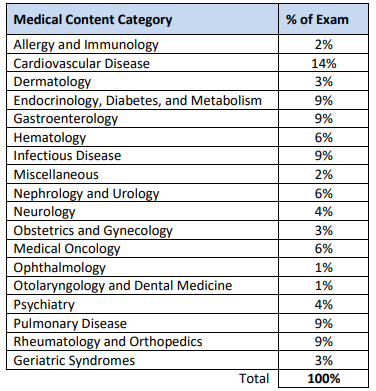How to Prepare for the ABIM Exam: Study Strategies That Work
How to prepare for the ABIM exam with blueprint-aligned study strategies, timed practice, mock exams, and proven methods for improving clinical reasoning.
< All Posts
Share this article
Subscribe
Subscribe

Preparing for the ABIM Internal Medicine Certification Exam is ultimately about aligning your study habits with the way ABIM designs, structures, and scores the test. The exam is comprehensive and demanding, but it is also predictable: ABIM publishes the blueprint, explains the exam format, describes what its questions measure, and provides guidance about the testing experience. When your preparation reflects these realities, the exam becomes much more approachable.
The exam assesses your ability to diagnose, interpret, manage, and reason through realistic patient scenarios across the full breadth of internal medicine. It also demands stamina; four timed sessions across a ten-hour appointment can challenge even strong clinicians. Most first-time examinees pass, but they do so because their study plan mirrors the logic ABIM uses to build the exam.
Start with the Blueprint: What ABIM Is Actually Testing
ABIM publishes a detailed Internal Medicine Certification blueprint that shows exactly how the exam is constructed: content categories, approximate percentages, and the types of tasks questions are designed to assess.
For a typical exam, the medical content categories and weights are:

On top of that, questions may incorporate cross-cutting themes such as critical care, prevention, geriatrics, women’s health, clinical epidemiology, ethics, nutrition, palliative and end-of-life care, adolescent medicine, occupational medicine, patient safety, and substance use.
If you want your performance to track the exam, your study time has to roughly track those percentages too. For example, cardiovascular disease at 14% should generally command substantially more of your schedule than, say, ophthalmology at 1%.
ABIM also explains what their questions are actually testing. Most items are single-best-answer multiple-choice questions built around patient scenarios that ask you to:
-
Make a diagnosis
-
Order and interpret tests
-
Recommend treatment or other patient care
-
Assess risk, prognosis, and apply epidemiologic principles
-
Use pathophysiology and basic science in clinical decisions
Any study plan that doesn’t explicitly acknowledge those tasks is leaving points on the table.
👉ABIM Exam Blueprint Explained: Topics, Weighting, and How to Use It
Understand the ABIM exam format and day-of structure
Becoming familiar with this structure early makes your preparation more realistic. The length of the exam and the density of the vignettes mean you’re preparing for cognitive endurance as much as content mastery. ABIM strongly encourages candidates to complete its online tutorial before exam day so that the interface and available tools feel familiar. Doing that ahead of time removes an unnecessary layer of stress when you sit down to test.
👉How Hard Is the ABIM Internal Medicine Certification Exam?
Build a Study Routine That Works Over Time
Short, regular study sessions tend to produce far better results than sporadic marathons. A daily session of thirty to sixty minutes, focused on a small set of mixed-topic questions followed by careful review, builds long-term retention and exposes you to the full spectrum of ABIM-style reasoning. On a weekly basis, working through a timed block similar to an ABIM section helps you refine pacing and recognize when you tend to slow down or misread stems. Every few weeks, rehearsing the exam-day rhythm with multiple consecutive blocks gives you a realistic sense of the attention curve you’ll need on test day.
A reasonable pattern (which you can scale up or down) looks like this:
Daily (30–60 minutes most days)
Short, focused sessions are your backbone. In each:
-
Do a small block of mixed-topic questions (e.g., 10–20 items).
-
Spend at least as much time reviewing explanations—especially missed questions—as answering.
-
Briefly reinforce preventive care, screening, or guideline-based management when it shows up.
Weekly (2–5 hours)
Once a week, mimic real block pacing:
-
One timed block of 50–60 questions, using two hours as your ceiling.
-
Review performance by content domain against the ABIM blueprint.
-
Identify one or two “priority weaknesses” to target the following week (e.g., rheumatology and endocrine).
Monthly (one long session)
Every 3–4 weeks, rehearse exam-day rhythm:
-
Four timed blocks in one day (or at least three if you’re early in prep).
-
Use a similar break structure to the real exam, drawing from your 100-minute pool.
-
Start at roughly the same time your actual appointment is scheduled.
The point of all of this is to distribute learning in a way that matches how the exam is built. You’re not memorizing facts; you’re training yourself to interpret information quickly, recognize thresholds for action, and apply best practice management decisions across a broad range of clinical domains.
Use Question Banks in a Way That Builds Reasoning, Not Just Recall
ABIM constructs its items as clinical vignettes that ask what you would do next, how you would interpret a test result, what diagnosis best fits the data, or what management strategy is most appropriate. A good question bank should replicate that structure. What matters most is not the brand but whether the questions feel like ABIM questions: realistic scenarios, plausible distractors, and explanations that show why one option is the best rather than simply labeling choices right or wrong.
The most valuable part of a Qbank is the review step. Understanding why you missed a question often teaches more than answering correctly on the first try. It helps to rotate between mixed blocks, which mimic ABIM’s unpredictability, and targeted blocks built around weak domains identified from your performance trends. Over time, you begin to recognize the patterns by which ABIM presents common conditions and high-impact clinical decisions.
👉What Is the Best Internal Medicine Question Bank for ABIM Exam Prep?
Run Full-Length Mock Exams to Build Stamina
The ABIM exam’s length is one of its most underestimated challenges. Testing your stamina ahead of time matters as much as learning the content itself. Running two or three full simulations—several blocks in a single day with the same break structure—conditions you to maintain clarity and pace through the later sessions.
These simulations also help you practice the “mark and move” mindset, rather than over-spending time on a single difficult item. Rehearsing when you will pause, how you use breaks, and how you navigate the interface gives exam day a sense of familiarity rather than uncertainty.
Prioritize the Systems and Conditions You’ll See Most
The highest-weighted ABIM domains—cardiovascular disease, pulmonary disease, gastrointestinal conditions, endocrine disorders, infectious disease, and rheumatologic disorders—should appear frequently in your study sessions. They represent core internal medicine practice, and they occupy a disproportionate share of the exam. Routine exposure to hematology, oncology, nephrology, neurology, and psychiatry will round out your preparation and prevent the kind of gaps that can dent your performance across blocks.
Within these systems, focus first on the common and high-impact clinical problems: heart failure, coronary disease, arrhythmias, COPD, pneumonia, asthma, CKD, diabetes, thyroid disease, and the infections and rheumatologic conditions every internist manages regularly. Breadth matters, but depth in the highest-weight categories pays the greatest dividends.
Use Prior Assessments as a Map of Your Weak Areas
If you took the internal medicine in-training exam during residency or have performance data from practice blocks, treat those as early warning systems. Identify the categories that consistently drag your performance down and assign them a regular place in your weekly schedule. The goal is to build upward momentum in those areas rather than hope they improve by osmosis while you focus on strengths.
👉ABIM Scoring Explained: How to Understand Your Results
Avoid common ABIM study pitfalls
Common missteps are surprisingly consistent: overinvesting in rare diagnoses at the expense of common ones, delaying timed practice until the final weeks, doing passive reading instead of active question-based review, and letting preparation become irregular. The ABIM exam rewards clarity, clinical reasoning, and attention to common internal medicine problems. Everything in your study plan should support those aims.
Build exam-day readiness, not just knowledge
ABIM devotes an entire section of its site to exam-day logistics: arrival and check-in, ID requirements, security procedures, test center rules, breaks, and exam tools.
Two to three weeks out, start treating exam day as something you’re rehearsing:
Two weeks before
-
Stabilize your sleep schedule and daily routine.
-
Practice the breakfast and hydration routine you plan to use.
-
Continue regular blocks and one or two timed sessions.
One week before
-
Complete the ABIM exam tutorial to be sure the interface feels familiar.
-
Focus question work on your “most-missed” domains and key high-yield topics.
-
Run at least one final multi-block simulation if you haven’t already.
Last 48 hours
-
Avoid heavy cramming. Light review only (brief question sets and high-level outlines).
-
Confirm test center location, parking, travel time, and what you’ll bring (IDs, any required documentation, allowed items).
-
Prioritize sleep and mental downtime.
On exam day
-
Arrive early (ABIM recommends 30 minutes before your appointment to complete check-in and biometrics).
-
Follow the pacing and break structure you practiced.
-
Answer every question—there is no penalty for guessing.
-
Use the review screen at the end of each section to ensure nothing is left blank.
👉ABIM Test-Day Experience: What to Expect
FAQs: Preparing for the ABIM Internal Medicine Exam
How long should I study for the ABIM exam?
It depends on your baseline and schedule, but many residents and early attendings use an 8–16 week window with 8–15 hours of focused study per week. The key is consistent, blueprint-driven work rather than a single intense push.
How many questions should I complete before the exam?
There’s no official ABIM requirement. A practical range is hundreds to low thousands of questions, as long as you review explanations carefully and repeatedly revisit weak domains.
Do I need to take full-length practice exams?
Yes, ideally at least two. The exam day is about ten hours with four timed sections and 100 minutes of pooled break time, and endurance plays a real role in performance.
Is one good Qbank enough, or do I need several?
One high-quality, ABIM-aligned Qbank is usually sufficient if you use it well: mixed blocks, targeted blocks, detailed review, and a few full-day simulations. Adding more banks helps less than using one bank deeply.
Is reading alone enough to pass?
Unlikely. Because ABIM asks case-based questions and tests applied reasoning, you need active practice with clinical vignettes, not just passive reading.
Should my study time match the blueprint percentages exactly?
It doesn’t have to be perfectly proportional, but your plan should clearly recognize that categories like cardiovascular, pulmonary, GI, endocrine, infectious disease, and rheumatology are heavily weighted and deserve more time than small categories such as ophthalmology or otolaryngology.
Next Steps
If you’re turning this into part of your ABIM content cluster, a natural “call to action” for the reader is:
-
Download or open the latest ABIM Internal Medicine exam blueprint.
-
Sketch a 10–12 week plan that allocates study time roughly in line with those content weights.
-
Choose one primary Qbank that clearly maps to the blueprint and start with small, mixed blocks.
-
Schedule at least two full multi-block simulations on your calendar now.
-
Bookmark ABIM’s “Exam Tutorials” and “Exam Day: What to Expect?” pages and treat them as required reading before your test date.
How can you prepare for the ABIM Exams? Med-Challenger Internal Medicine Boards Prep


